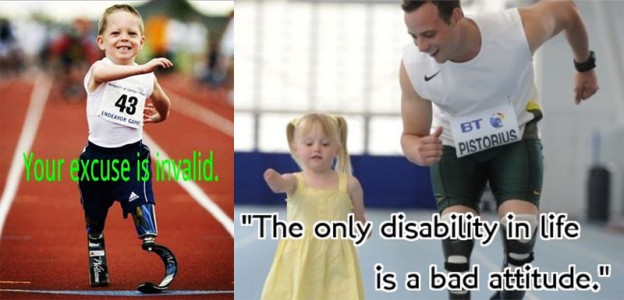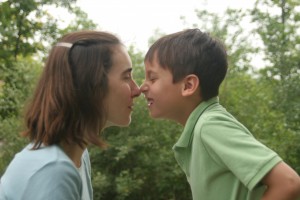
Inspiration Is Not Inclusion
“You’ve just got to see this story about…!”
“Did you see that amazing video?”
“Have you heard about the child who…?”
“What about that athlete…?”
Chances are, you’ve seen some of the many inspirational videos, memes, and news stories about individuals with disabilities this year. And chances are, your friends and family shared them with you because they thought you’d be inspired, too.
Most people seem to view these images as harmless or even positive, because they can help increase awareness of the challenges faced by people with disabilities on a daily basis. But at the same time, there is growing concern over certain types of inspirational media, such as pictures of adorable children doing everyday activities like walking, running, swimming, hugging, smiling, drawing a picture with a caption such as, “The only disability in life is a bad attitude,” “Your excuse is invalid,” and “Before you quit, try.” Then there are the feel-good stories about athletic teams breaking the rules of the game to let a team member with a disability score the final point of the season.
So what’s the problem with that?
1. The purpose of these images and stories is to highlight differences between people with and without disabilities. Journalist Stella Young calls it “inspiration porn,” because “it's there so that non-disabled people can look at us and think, ‘well, it could be worse... I could be that person.’ In this way, these modified images exceptionalise and objectify those of us they claim to represent.”
2. The profusion of these images and stories supports patronizing or condescending attitudes toward people with disabilities. When a team throws a game for a teammate with a disability, they are consciously treating him as less of a person.
3. Pairing up these images with inspirational slogans minimizes the very real challenges that people with disabilities and their families cope with every day, writes blogger Katherine Coble. Most of these challenges cannot be overcome by extra effort or quick solutions. For example, many therapies and many types of medical equipment are not affordable and not covered by insurance. Physical barriers in public places still exist for people with mobility impairments.
Some families cope with severe behavioral problems that lead to hospitalizations for the person with a disability and his or her caregiver. Sometimes these challenges are beyond the understanding of friends and extended family, so the immediate family is left alone.
4. Inspiration without activism equals exclusion. Many inspirational images and stories are shared via social media without any type of follow-up or real transformation, so it’s really a method to evade responsibility for inequity. Writer S.E. Smith notes, “Using us as objects to be inspired by, or archetypes to beat people with, allows people to avoid any complicity they have in the way disabled people are treated in their society. As they talk about how ‘inspiring’ we are, few of them make moves for positive changes in our lives, or theirs, for that matter.”
5. It doesn’t even make sense to be inspired by someone who shops for groceries, uses a telephone or rides a bus. A profoundly average life is not a source of inspiration, and yet many people with disabilities are constantly told that they are inspirational, seemingly for being alive at all. Comedian Laurence Clark illustrates this point by congratulating random strangers on their “inspirational” activities. Did his video make you uncomfortable? That's exactly the point!
So my answer to those questions is: no, I didn’t see that video, news clip, story or photo. I was too busy living my life and taking care of my family. My job is to find ways to include my children in every aspect of community life, and inspiration is not the path to inclusion.


